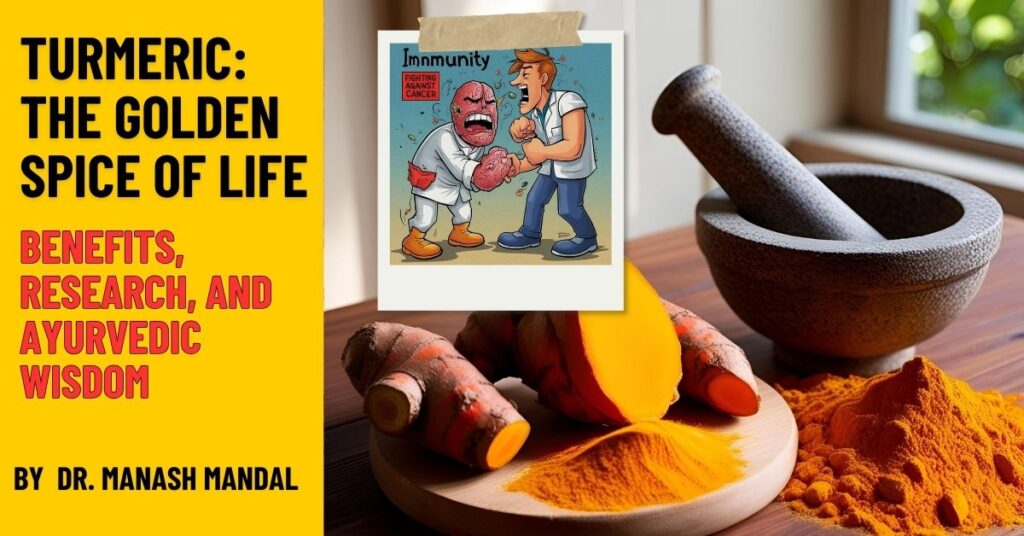Turmeric (Curcuma longa), known as the “golden spice,” has been an essential part of Ayurveda and traditional medicine for thousands of years. It is revered not only for its culinary uses but also for its powerful medicinal properties. Modern research continues to validate the numerous health benefits of turmeric, making it one of the most studied medicinal herbs globally. This article explores the benefits of turmeric, backed by scientific research and Ayurvedic wisdom.

Nutritional Profile of Turmeric
Turmeric contains bioactive compounds called curcuminoids, the most important of which is curcumin. It also contains essential oils, proteins, carbohydrates, fiber, and minerals like potassium, iron, and manganese.
Health Benefits of Turmeric
1. Potent Anti-Inflammatory Properties
Chronic inflammation is linked to various diseases, including arthritis, heart disease, and cancer. Curcumin, the active compound in turmeric, is a powerful anti-inflammatory agent that rivals some anti-inflammatory drugs, without the side effects.
Scientific Study: A study published in Oncogene (2004) found that curcumin is more effective in reducing inflammation than aspirin and ibuprofen.
2. Powerful Antioxidant Effects
Oxidative stress leads to aging and numerous chronic diseases. Turmeric is a potent antioxidant that neutralizes free radicals and boosts the body’s own antioxidant enzymes.
Research Evidence: A study in Phytotherapy Research (2014) reported that curcumin significantly enhances antioxidant capacity in the body, protecting against oxidative damage.
3. Boosts Brain Function & Reduces Risk of Neurodegenerative Diseases
Curcumin crosses the blood-brain barrier and has been shown to reduce symptoms of depression, anxiety, and neurodegenerative diseases like Alzheimer’s.
Scientific Study: Research published in Journal of Psychopharmacology (2015) found that curcumin supplementation improved mood and cognitive function in elderly individuals.
4. Supports Heart Health
Turmeric improves heart health by enhancing endothelial function and reducing the risk of heart disease.
Study Finding: A study in The American Journal of Cardiology (2012) found that curcumin reduced the risk of heart attacks in post-bypass surgery patients by 65%.
5. Helps in Arthritis and Joint Pain Relief
Ayurveda has used turmeric for centuries to treat joint pain and arthritis. Modern studies confirm its effectiveness in reducing joint inflammation and stiffness.
Clinical Evidence: A meta-analysis in Journal of Medicinal Food (2016) concluded that curcumin is as effective as NSAIDs (like diclofenac) in reducing arthritis pain.
6. Aids Digestion and Gut Health
Turmeric is beneficial for digestion by stimulating bile production and reducing symptoms of indigestion and bloating.
Ayurvedic Insight: According to Ayurveda, turmeric balances the Pitta and Kapha doshas, helping in conditions like acid reflux and irritable bowel syndrome (IBS).
7. Natural Antimicrobial and Immunity Booster
Turmeric is a powerful natural antibiotic and antimicrobial agent. It strengthens immunity and protects against infections.
Research Data: A study in Journal of Clinical Immunology (2018) found that curcumin enhances immune response and reduces the severity of infections.
8. Aids in Cancer Prevention
Studies suggest that curcumin has anticancer properties by inhibiting tumor growth and preventing the spread of cancer cells.
Scientific Study: A review in Cancer Letters (2015) concluded that curcumin can suppress tumor growth and prevent metastasis.
Ayurvedic Uses of Turmeric
In Ayurveda, turmeric is considered a “Rasayana” or rejuvenating herb that promotes overall well-being. Some traditional uses include:
Haldi Doodh (Golden Milk) – A potent immunity booster
Turmeric Paste – Applied externally for wound healing and skin care
Turmeric Water – Consumed for detoxification
Herbal Remedies – Mixed with honey or ghee for respiratory health
How to Incorporate Turmeric into Your Diet
Add fresh or dried turmeric to curries, soups, and teas
Consume turmeric with black pepper to enhance curcumin absorption
Take turmeric supplements under medical guidance
Conclusion
Turmeric is a powerful medicinal herb backed by both Ayurvedic tradition and modern science. With its anti-inflammatory, antioxidant, and immune-boosting properties, it is a must-have in every household. Including turmeric in your daily routine can significantly improve health and well-being.
References:
Aggarwal, B. B., & Sung, B. (2009). Pharmacological basis for the role of curcumin in chronic diseases. Biochemical Pharmacology.
Gupta, S. C., Patchva, S., & Aggarwal, B. B. (2013). Therapeutic roles of curcumin. Advances in Experimental Medicine and Biology.
Hewlings, S. J., & Kalman, D. S. (2017). Curcumin: A review of its effects on human health. Foods.
By embracing this golden spice, we can tap into its incredible healing potential and lead a healthier life.
